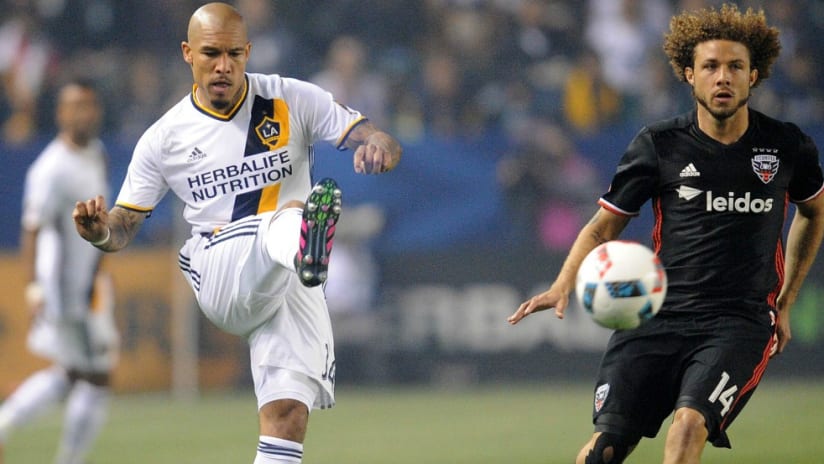CARSON, Calif. – Nigel de Jong grew up in Amsterdam and joined Ajax's youth academy when he was 8, so he was immersed in Johan Cruyff's ideas about soccer at a very young age. The impact was extraordinary.
The LA Galaxy midfielder, a veteran of two World Cups and two European Championships with the Netherlands, paid tribute Thursday to Cruyff, who died at 68 earlier in the day following a five-month battle with lung cancer, calling the Dutch legend “one of the greatest of all times.”
“I think you can speak to everybody in football, everybody got something positive to say about Cruyff. And that is for a reason,” de Jong said following the Galaxy's training session at StubHub Center. “I think he is by far the most well-known person in Holland. You speak about Holland, you speak about Johan Cruyff.”
Cruyff was a mammoth presence in the game, an intellectual whose concepts – developed in the late 1960s and early 1970s with manager Rinus Michels at Ajax and with the Dutch national team – created the foundation for modern soccer. He was an extraordinary player, a lithe and deceptively speedy forward who played until he was 37, a giant among managers who was pivotal in creating the dynasties at Ajax and Barcelona, and an outspoken, sometimes fiery critic who famously pronounced that “quality without results is pointless [and] results without quality is boring.”
“I think it is respectful to say he's a game-changer,” said de Jong, who debuted for Ajax at 17 and played four seasons for the Amsterdam club before moving on to Hamburger SV, Manchester City, AC Milan and the Galaxy. “ He was a game-changer, especially in the whole era of the '70s, transition to the '80s and the beginning of the '90s. He created 'Total Football,' what we call in Holland, the more offensive kind of style ... and he brought a system that gave football the joy and excitement again.”
Cruyff guided Barcelona to its first European Cup championship, in 1992, and his philosophy still informs the club and was a foundation of Spain's national team's success over the last dozen years.
“Ajax's system was basically based on his philosophy, the 4-3-3 system – the famous 4-3-3 system, but with a lot of the possession of the ball and a lot of football,” de Jong said. “He had that mindset of playing always in an attacking, offensive style of football, and he put it together not only at the Ajax youth system, but also at Barcelona. The way how they play nowadays is all his philosophy. And you have to give credit to him for being such a great influence over the years, and he still is.”
De Jong never played for a Cruyff-coached team, but he “saw him a couple of times around the national team and also around Ajax.”
“He was such a junkie, if I can say that, for football. He just loved the game so much,” de Jong said. “It was, like, an addictive thing with him. He could sit there and speak to you for, like, 24 hours just about football, and that's what makes him so great. He saw everything that was going around, not only on the pitch, but also outside the pitch, the mental aspect of the game as well.”
Cruyff played two seasons in the old North American Soccer League, scoring 14 goals in 27 games in 1979 under Michels for the Los Angeles Aztecs and 10 goals in 27 games in 1980 for the Washington Diplomats.
Galaxy coach Bruce Arena, who first saw Cruyff as Holland dominated West Germany but lost in the 1974 World Cup final, watched him play in the NASL.
“He was a terrific player and personality, and sorry he leaves us at what I like to believe is still a young age. I think [Cruyff's philosophy] influenced everyone. ... That's genius, and I'm not in that category. But he was a genius, no question about it. His comments about the game, I think, were very instructional as well, influential.”












